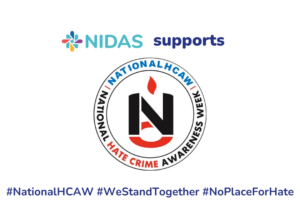National Hate Crime Awareness Week 2023
Each year, October plays host to National Hate Crime Awareness Week, organised by 12-23-20NationalHCAW. It was originally founded to mark the 10th anniversary of the London Nail Bomb attacks on Brixton, Brick Lane, and Soho. The 12-24-30 part of its name comes from the dates of the three attacks – 17th, 24th, and 30th April.

The aim of National Hate Crime Awareness Week is to:
- Raise hate crime awareness
- Improve operational responses to hate crime
- Prevent hate crime
- Empower communities affected by hate crime
What is a hate crime?
A hate crime is any criminal offence which is perceived by the victim or any other person to be motivated by hostility or prejudice based on race, religion, sexual orientation, disability, and gender.
Examples of hate crime include:
- Physical attacks: physical assault, damage to property, offensive graffiti, and arson
- Threat of attack: inciting hatred via words, pictures, or videos, offensive letters, abusive or obscene telephone calls, groups hanging around to intimidate others, and unfounded malicious complaints.
Not all hate incidents will amount to criminal offences, but it is important that these are reported and recorded by the police.
Physical assault
Physical assault of any kind is an offence. If you’ve been a victim of physical assault, the incident should be reported. Depending on the level of the violence used, a perpetrator may be charged with common assault, actual bodily harm, or grievous bodily harm.
Verbal abuse
Verbal abuse, threats or name-calling can be a common and extremely unpleasant experience for minority groups. Victims of verbal abuse are often unclear whether an offence has been committed or believe there is little they can do. However, there are laws in place to protect you from verbal abuse.
Incitement to hatred
The offence of incitement to hatred occurs when someone acts in a way that is threatening and intended to stir up hatred. That could be in words, pictures, videos, music, and includes information posted on websites.
Misogyny and Nottinghamshire Police
Misogyny is the hatred or prejudice against women, typically exhibited by men. Nottinghamshire was ahead of the game and the first police force in the country to treat misogyny as a hate crime in 2016, and this was then evaluated in 2018 as part of extensive research by experts at the universities. The research found that 93.7% of women had experienced harassment and 87% of the public wanted the police to treat this behaviour as a hate crime and for this to be rolled out nationally. The research recommended that gender or sex should be protected in hate crime law and has directly informed amendments to the Upskirting Bill.
Nottinghamshire Police defines misogyny hate crime as: “Incidents against women that are motivated by an attitude of a man towards a woman and includes behaviour targeted towards a woman by men simply because they are a woman”. This is where as women we can report when we hear misogyny taking place to try to break the cycle of this behaviour and to ensure that it is not acceptable for the next generation.
What about domestic abuse?
Do not fear, domestic abuse will not be recorded as a misogyny hate crime because it has its own procedure.
Find out more about hate crime and how to report it on the Nottinghamshire Police website.
Domestic abuse support
If you need any support for any aspect of domestic abuse, please get in touch with us.